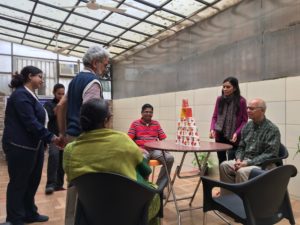 On 24th March, 2018 we complete 100 successful sessions of our Cognitive Wellness Programme, based on the principles of Cognitive Stimulation Therapy designed by Dr. Martin Orrell, Aimee Spector, Bob Woods and other from University College of London. This is a non-pharmacological group therapy based programme for people with initial to mild stage dementia.
On 24th March, 2018 we complete 100 successful sessions of our Cognitive Wellness Programme, based on the principles of Cognitive Stimulation Therapy designed by Dr. Martin Orrell, Aimee Spector, Bob Woods and other from University College of London. This is a non-pharmacological group therapy based programme for people with initial to mild stage dementia.
Our journey through the program so far has been full of excitement, evolution and new insights.
We are grateful to our members, the elderly with dementia who participated in the program. We thank each and every one of them for their unforgettable company and genuine warmth.
Here are some highlights from the 100 days!
- We started with just one member on 12th July 2017!
- We moved up to a total of 6 members over time, which is the recommended group size for this programme
- Yoga was introduced as an initial activity for all members and they enjoy sitting in the larger group and staying active
- Our activities included worksheets, discussions and conversation
- Art and craft, music and videos were introduced to the group for multi-sensory stimulation
- We followed the CST guidelines closely, with customization of the modules to the Indian context.
Celebrations
While the interventions were based on the recommended modules, we complemented it with lots of celebrations, to make the members feel socially inclusive
- We celebrated the birthdays with flowers and cake cutting.
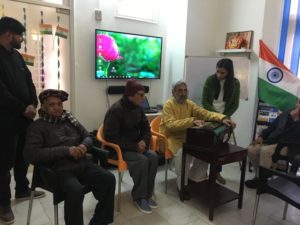
- All festivals like Holi, Diwali, and Christmas were celebrated with special activities like diya painting, art and craft and music.
- For Republic Day, the members rehearsed a patriotic song and successfully sang for the larger group.
- Members also made cards for their loved ones on Valentine’s Day. They wrote heartfelt messages themselves inside the cards and surprised all of us.
Heart touching moments
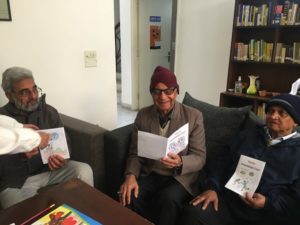 Through our journey, we saw many friendships develop, it started with the bond between our first two members. They started to greet each other more and more warmly each passing day. The lady (who was more verbal than the gentleman) started to defend him when anyone asked him a question. We also sensed that the gentleman was distracted as he missed her presence whenever she would be absent.
Through our journey, we saw many friendships develop, it started with the bond between our first two members. They started to greet each other more and more warmly each passing day. The lady (who was more verbal than the gentleman) started to defend him when anyone asked him a question. We also sensed that the gentleman was distracted as he missed her presence whenever she would be absent.
We saw the group cheer for another member with Aphasia by clapping whenever he spoke. Somewhere the group could sense and rejoice in the small accomplishments of their peers.
We were touched each time one member spoke fondly of his wife. When making a card for Valentine’s Day, we asked him what he liked about his wife. He said ‘everything’ and he wrote the same in his card.
We noticed another two gentlemen become friends, they shook hands each time they met and were always extending courtesies during the session. Walking together, holding hands, they explored their way around the centre and even to the restrooms!
In our module on marriage, when we discussed the age at which many get married, one of the lady members asked us with dismay “Why was I married off so early then?” We quickly redirected her by speaking about the wonderful life she had led thereafter.
Our sessions also brought people together from the same region and culture. They often talk to each other in their native Sindhi, while all of us stood marveled.
The accomplishments we are proud of!
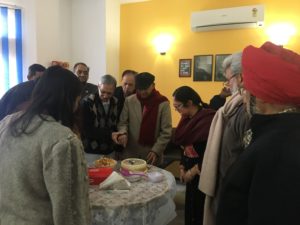 The 100 sessions we went through have also been very rewarding. We noticed the members learn, grow and adapt to the group. Here are some of the things we noticed with time:
The 100 sessions we went through have also been very rewarding. We noticed the members learn, grow and adapt to the group. Here are some of the things we noticed with time:
- The most rewarding fact is that they enjoy coming and look forward to the visits.
- Reduced restlessness during session as the person comes regularly.
- Many members start to remember the names of facilitator and the organization.
- Many quiet members started to open up and be more social.
- Most of the members always remember the theme songs and sing along.
- Often, they are able to surprise us during the activity with a marvelous thought or performance.
Our learnings
Here are some of our key learnings: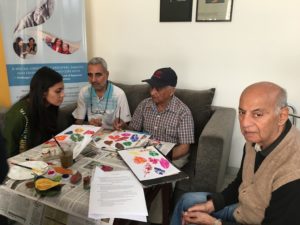
- Settling in – Initially when a member joins it does take a couple of days before he or she settles down into the programme, it always helps if the primary care giver is there for those initial days.
- Patience – We have learnt that patience is the key when managing a group of elderly with dementia. You have to wait for the time it takes for them to respond. You also have to give them some time to adjust to the group. Another area is when they are repetitive, you need to be able to respond appropriately as many times as needed.
- Redirection – This is a skill that makes it easier to help people with dementia when they are agitated, upset or repetitive. Diverting their attention spontaneously is important.
- Improvise – Despite all the planning that goes into each session, there will be times when the session will have to change as per the moods of the group. We need to be prepared for more than just that day’s module.
- Crisis Management – There are unexpected events that happen in a group that may require you to manage immediately and be on your toes.
The challenges we face
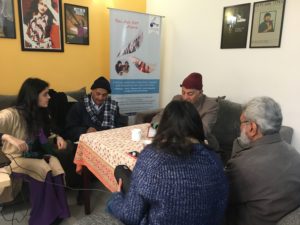 The biggest challenge we have faced is absenteeism and discontinuation of sessions. Missing a few days of the sessions may happen due to illness. However, when a regular member has to leave for a longer duration (sometimes as long as 1 month)—it can be disheartening for the entire group. It often throws the group off balance temporarily. The most common reason for absenteeism is travel to a different location and lack of travel arrangements to the centre.
The biggest challenge we have faced is absenteeism and discontinuation of sessions. Missing a few days of the sessions may happen due to illness. However, when a regular member has to leave for a longer duration (sometimes as long as 1 month)—it can be disheartening for the entire group. It often throws the group off balance temporarily. The most common reason for absenteeism is travel to a different location and lack of travel arrangements to the centre.
Another challenge was accepting people who are at a different stage of dementia. Our Cognitive Wellness Programme is based on CST, so we admit only those elderly who are in the mild stage or in the beginning of moderate stage of dementia. Such individuals are able to sit for an hour, take part in activities, and hold conversations with each other.
Currently our programme is best suited for people in Gurgaon as one can conveniently manage to come for the program. However, we do have dedicated clients from Delhi who bring in their elderly for the programme.
We at Samvedna Senior Care aim to help seniors live happy, active and independent lives, in the comfort of their home and community through interactive caregiving.
Samvedna Senior Care was established in October 2013 with two complementary goals – firstly to provide quality home care services to seniors with limited mobility or dementia and hence social interaction, and secondly to facilitate stimulating community interaction and participation.
Our Dementia Care services are –
Cognitive Wellness Programme, Sector 57 Gurgaon –
Samvedna’s Cognitive Wellness Programme is designed for seniors with mild cognitive impairment, early dementia or Parkinson’s, and elderly lacking in enthusiasm and motivation. The aim is to stimulate the mind of the elderly to slow the progression of the disease or impairment. The sessions are 3 days a week, 11AM-1PM.
More – http://www.samvednacare.org/our-work/cognitive-wellness-programme
Coming soon – a place where people with dementia, at all stages, can chill and let their hair down. People with dementia also want to laugh, sing, chat and drink tea with their pals. But their disease tends to isolate them from their friends and family. They are all welcome to join us and hopefully they will find a fun activity, a warm chair or a kind friend at this social club for people with dementia.
At-home services –
Dementia intervention activities by trained Care Specialists (already mentioned above). These services are available in Delhi NCR
More – http://www.samvednacare.com/
Please call us for more info – Delhi NCR – 98184 21446, 124 4229659
Dementia Support Group –
Our Dementia Support group in Delhi NCR and Guwahati is a platform for caregivers to share feelings and support each other.
More – http://www.samvednacare.org/our-work/dementia-care
Please call us for more info – Delhi NCR – 98184 21446, 124 4229659
32
